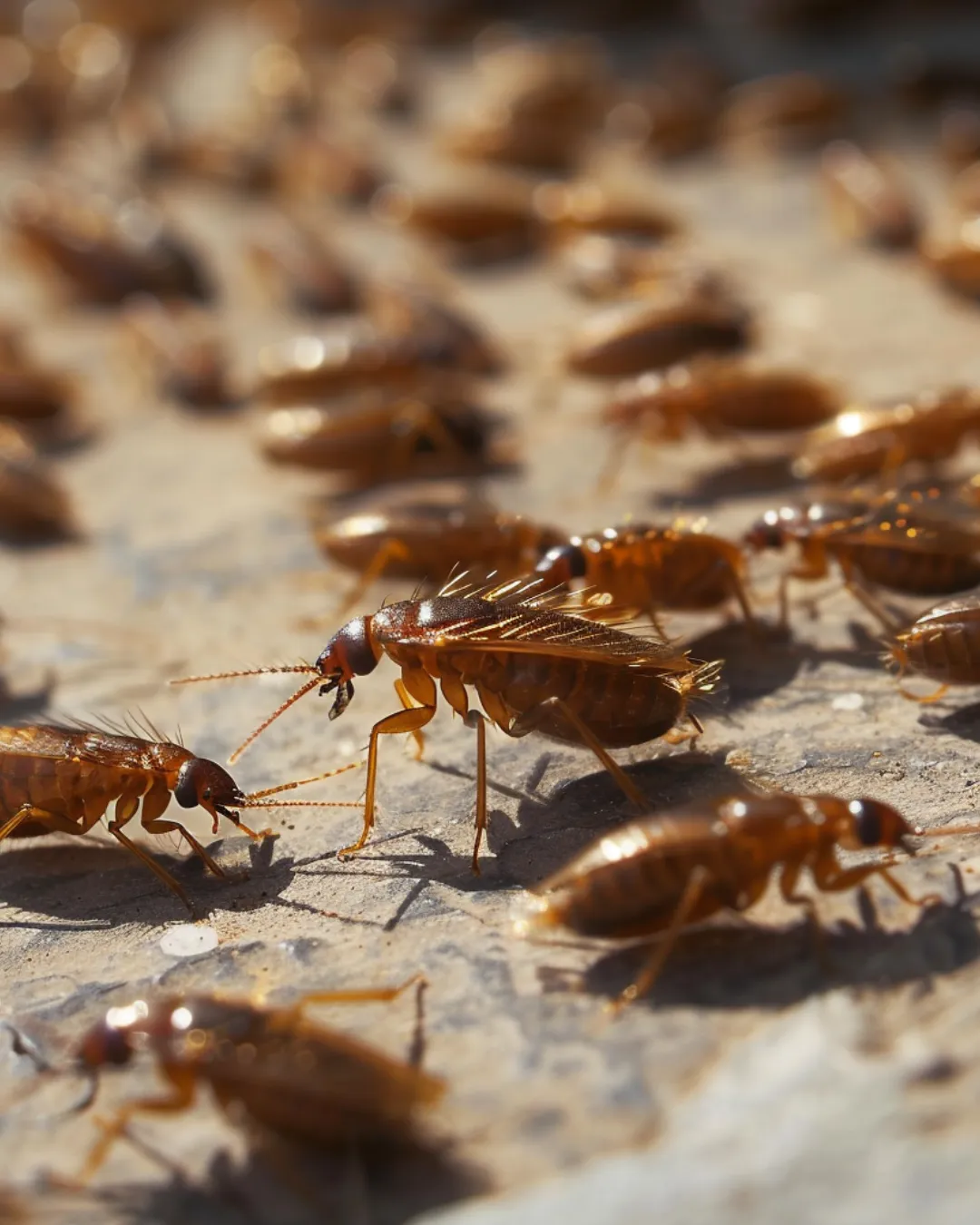Designed To Educate, Motivate & Inspire
The Western Way Journal

Effective Management of Fleas and Ticks During Their Peak Season
The Hidden Dangers of Fleas and Ticks
Fleas and ticks are more than just irritating. They are carriers of diseases that can be seriously harmful. Ticks are notorious for transmitting Lyme disease, which can lead to severe long-term health issues in both humans and pets. Fleas can spread typhus and tapeworms, posing additional health risks.
Key Strategies to Protect Your Family and Pets
Regular Checks: During peak season, it's vital to regularly check your pets and any family members after spending time outdoors, especially in grassy or wooded areas where ticks are prevalent.
Use of Preventatives: Applying vet-recommended flea and tick prevention treatments to your pets can drastically reduce the chances of an infestation spreading into your home.
Maintaining Your Yard: Keeping your lawn trimmed and removing tall weeds reduces the habitat fleas and ticks thrive in, minimizing the likelihood of them hopping onto your pets or you.
Professional Pest Control Services: Utilizing professional pest control services can provide an added layer of defense, offering specialized treatments that protect your entire property from these pests.
Detailed Overview of Diseases Transmitted by Fleas and Ticks
Fleas and ticks are more than just pesky irritants; they are vectors of several serious diseases that can affect both humans and pets. Understanding these diseases, recognizing their symptoms, and knowing how to prevent them is crucial for maintaining the health and safety of your household. Here's a deeper look at some common conditions transmitted by these pests:
Lyme Disease
Transmission: Primarily spread through the bite of infected black-legged ticks (commonly known as deer ticks).
Symptoms: Fever, headache, fatigue, and a characteristic skin rash known as erythema migrans. If left untreated, the infection can spread to joints, the heart, and the nervous system.
Treatment: Early stages can typically be treated effectively with a few weeks of antibiotics. Prompt treatment is crucial to prevent long-term complications.
Prevention: Avoid tick-infested areas, use tick repellents, perform regular tick checks after outdoor activities, and use tick prevention products on pets.
Rocky Mountain Spotted Fever (RMSF)
Transmission: Spread by several species of ticks, including the American dog tick, Rocky Mountain wood tick, and the brown dog tick.
Symptoms: Sudden onset of fever, headache, rash, nausea, vomiting, stomach pain, muscle pain, and lack of appetite. The distinctive red, non-itchy rash typically starts on the wrists and ankles before spreading.
Treatment: RMSF is treatable with antibiotics, and early treatment is critical as the disease can become severe without proper management.
Prevention: Minimize exposure to tick environments, use protective clothing and tick repellents, and maintain a clean and tick-free yard.
Ehrlichiosis
Transmission: Transmitted to humans by the lone star tick, found primarily in the southeastern and south-central states.
Symptoms: Fever, chills, severe headaches, muscle aches, nausea, vomiting, diarrhea, and sometimes a rash. Symptoms usually start within 1-2 weeks after a tick bite.
Treatment: Effective treatment includes the prompt administration of the antibiotic doxycycline.
Prevention: Protective measures similar to those for other tick-borne diseases apply here, focusing on personal protection and environmental management.
Flea-borne (Murine) Typhus
Transmission: Transmitted by fleas carrying Rickettsia typhi or Rickettsia felis bacteria. It is more common in warm, coastal regions.
Symptoms: Fever, headache, muscle pain, and a rash that typically starts on the trunk of the body and spreads. Many cases are mild, but severe complications can occur if not treated.
Treatment: Antibiotics are effective in treating flea-borne typhus, with doxycycline commonly prescribed.
Prevention: Control flea infestations in and around the home, treat pets for fleas, and reduce wildlife (especially rodents) around living areas as they can carry infected fleas.
Alternative and Natural Remedies for Flea and Tick Control
Here are some natural strategies that can help repel these pests and reduce their presence in your environment:
Diatomaceous Earth
How It Works: Diatomaceous earth is a powder made from the fossilized remains of diatoms, a type of algae. Its microscopic sharp edges can dehydrate and kill fleas and ticks on contact.
Application: Sprinkle diatomaceous earth around areas where pets spend time, along baseboards, and in outdoor areas where fleas and ticks might be prevalent. Ensure you use food-grade diatomaceous earth to ensure safety for pets and humans.
Essential Oils
Effective Oils: Certain essential oils are known for their pest-repelling properties. Oils such as eucalyptus, peppermint, lavender, and cedarwood can be effective against fleas and ticks.
Usage: Mix a few drops of essential oils with water or a carrier oil and apply it to areas where pests are a concern. Note that some essential oils can be toxic to pets, especially cats, so it's important to use them cautiously and consult with a vet before application.
Nematodes
Beneficial Nematodes: These microscopic worms are natural predators of flea larvae. They can be used in your garden to control flea populations without resorting to chemical treatments.
Application: Nematodes can be purchased at garden centers or online. Apply them to moist soil areas, especially where pets might frequent, to naturally reduce flea populations.
Vinegar Solution
Method: A mixture of vinegar and water can be used as a repellent spray for fleas and ticks. The strong odor and acidic nature help deter these pests.
Preparation: Mix equal parts of vinegar and water and spray in affected areas, on pet bedding, and even directly on pets, avoiding sensitive areas such as eyes and ears.
Maintaining a Clean Environment
Regular Cleaning: Regular vacuuming of floors, carpets, and furniture can help remove fleas and their eggs. Washing pet bedding and your bedding in hot water weekly can also help prevent flea infestations.
Yard Maintenance: Keep your lawn trimmed and remove excess debris where ticks and fleas might hide. Creating a dry barrier with gravel or wood chips can deter ticks from entering your yard from wooded areas.
Why Professional Intervention Is Crucial
While DIY methods can provide temporary relief, the expertise of a professional pest control service like Western Way Termite & Pest Services ensures comprehensive management of flea and tick populations. Professionals can treat large areas efficiently and provide ongoing solutions tailored to your specific environmental conditions and pest challenges.
Professionals also bring a deeper understanding of the life cycles of these pests and can implement integrated pest management strategies that reduce pest populations over the long term, not just treating an immediate infestation but preventing future ones.
Ensuring a Safe Summer
With the right knowledge and tools, you can enjoy the warmer months without the added worry of flea and tick-borne illnesses. Let Western Way Termite & Pest Services help you establish a pest management plan that keeps your summer safe and enjoyable for your entire family and your furry friends.
For more detailed information on how to protect your home and loved ones from fleas and ticks this season, or to schedule a professional inspection, please visit our website at [https://westernwayservices.com/]. Your peace of mind is our top priority.
Office:
8505 Church St Suite 7 Gilroy, CA 95020
Call
(408)
676-4774
Email:

Copyright 2024. All Right Reserved.
